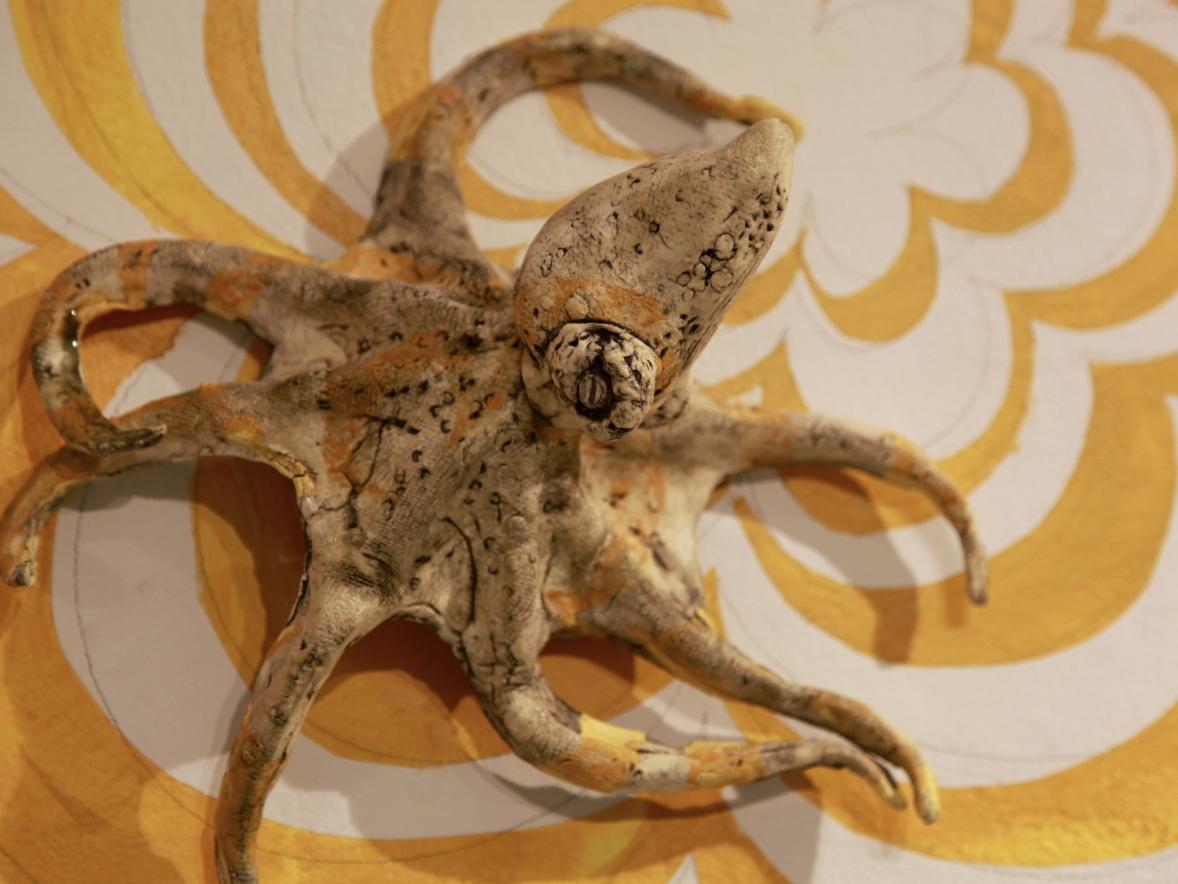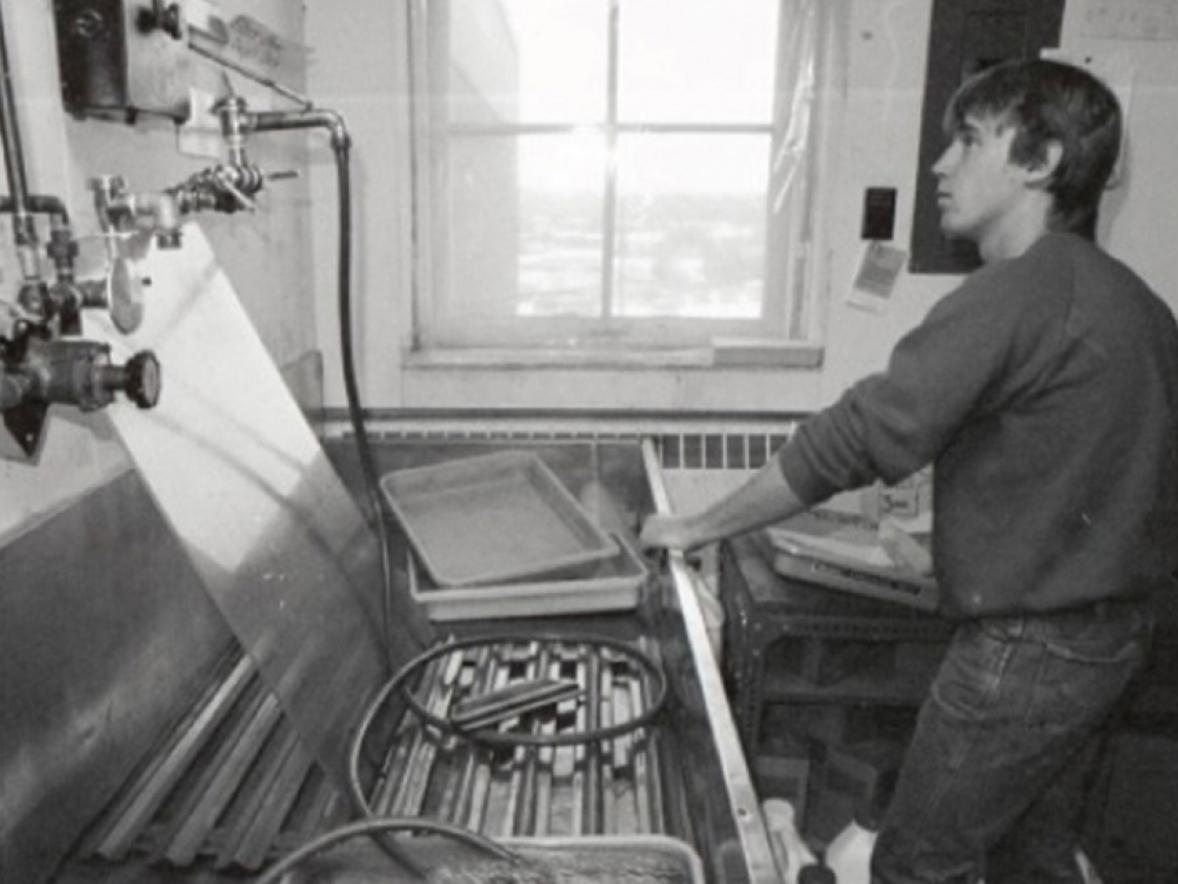Our primary mission is to increase and enhance ethics across the campus community. Some of the programs we offer are the following:
- Applied ethics certificate
- Discussion societies
- Book clubs
- Workshops
- Consultations
- Grants & research participation
- Research opportunities
Upcoming Speakers
Trauma and Tragedy in the Age of Mass Politics
Date: February 23, 2026 | 5:30 p.m.
Location: Harvey Hall Theatre
Panelists: Lopa Basu, Chris Freeman, Courtney Juelich, Yutika Keny, Kamran Shams
Abstract: Political and cultural violence in America has reached alarming new levels, and mass media and politics have made it difficult to create an authentic emotional response to tragedy and the trauma it creates. Five panelists, comprised of students, staff, and faculty, will examine the historical and contemporary contexts of trauma and tragedy and the freedom to feel as a fundamental human right and necessary precondition for well-functioning democracies and emotional well-being.
Civil Liberties, Law Enforcement, and Protest
Date: February 25, 2026 | 6:00-7:30 p.m.
Location: Harvey Hall Theatre
Panelists: Tina Lee, Richard Gee, Courtney Juelich, Rickie-Ann Legleitner
Abstract: Recent events in Minneapolis, St. Paul, and Chicago have brought up important questions about how government agencies enforce laws and the role of protest and legal observing in protecting civil liberties. A panel of UW-Stout experts will share their thoughts followed by time for the community to ask questions.
Workplace Censorship
Date: March 11, 2026 | 3:00-4:30 p.m.
Location: Memorial Student Center (Ballroom A)
Speaker: J.P. Messina

Abstract: The United States legal context allows employers to fire or sanction their employees whether they have good reason, bad reason, or no reason at all. They may, (unless prohibited by state or local statute) dismiss employees regardless of whether the grounds for dismissal are relevant or irrelevant to the person's job performance. They may discipline employees regardless of whether the behavior for which the employee is dismissed is constitutionally protected. Among other things, this legal environment protects employers’ rights to fire employees for exercising freedoms guaranteed them under the First Amendment. This can leave employees dominated precisely where it most matters that they are free: in the exercise of their political liberties. And this concerns us all: If employer censorship becomes widespread, discourse can suffer as people withhold their controversial views from the public sphere. All of these are sensible concerns. I argue in this talk, however, that it would be shortsighted to pursue a legal remedy for them—particularly one that extends statutory protection for employee speech rights against their employers. This is because we have good reason to recognize that employers--at least of certain kinds--have strong rights to the freedom of association. Additionally, firms sometimes have expressive liberties of their own. Legal remedies of the sort found in roughly half of states violate these freedoms. But they are also not guaranteed to improve our environment for discourse. Indeed, they may make it worse. Despite my skepticism of legal remedies, however, I argue that employers have strong reasons, both instrumental and moral, to avoid playing the censor. When they fail and act contrary to these reasons, the public must hold them accountable. A lot hangs in the balance.
Bio: JP Messina is an associate professor in the Department of Philosophy at Purdue University. He offers courses in moral and political philosophy, the ethics of data science, and the history of practical philosophy. Before joining the faculty at Purdue, he held research positions at the University of New Orleans and Wellesley College. He received his Ph.D. from UC San Diego in 2018. His first book, Private Censorship, was recently published with Oxford University Press.
Roads Not Taken: How Evangelicals Embraced MAGA
Date: March 25, 2026 | 6:00-7:30 p.m.
Location: Memorial Student Center (Cedar/Maple)
Speaker: John Fea

Abstract: Dr. Fea will discuss how evangelicals were presented with alternative roads of political engagement in the early 2000s, but ultimately chose a road that led them to Trump in 2016.
Bio: Dr. Fea is Professor of American History and Chair of the History Department at Messiah. He is the author or editor of six books and his essays and reviews have appeared in a variety of scholarly and popular venues. Among his books are Believe Me: The Evangelical Road to Donald Trump (Eerdmans, 2018) and Was America Founded as a Christian Nation: A Historical Introduction (Westminster/John Knox Press, 2011).
Invisible Infrastructure: Reclaiming a Humanities-Inspired Technology Landscape
Date: May 19, 2025 | 11:30-12:30 p.m.
Location: The Great Hall (2025 Polytechnic Summit)
Speaker: Rishi Jaitly
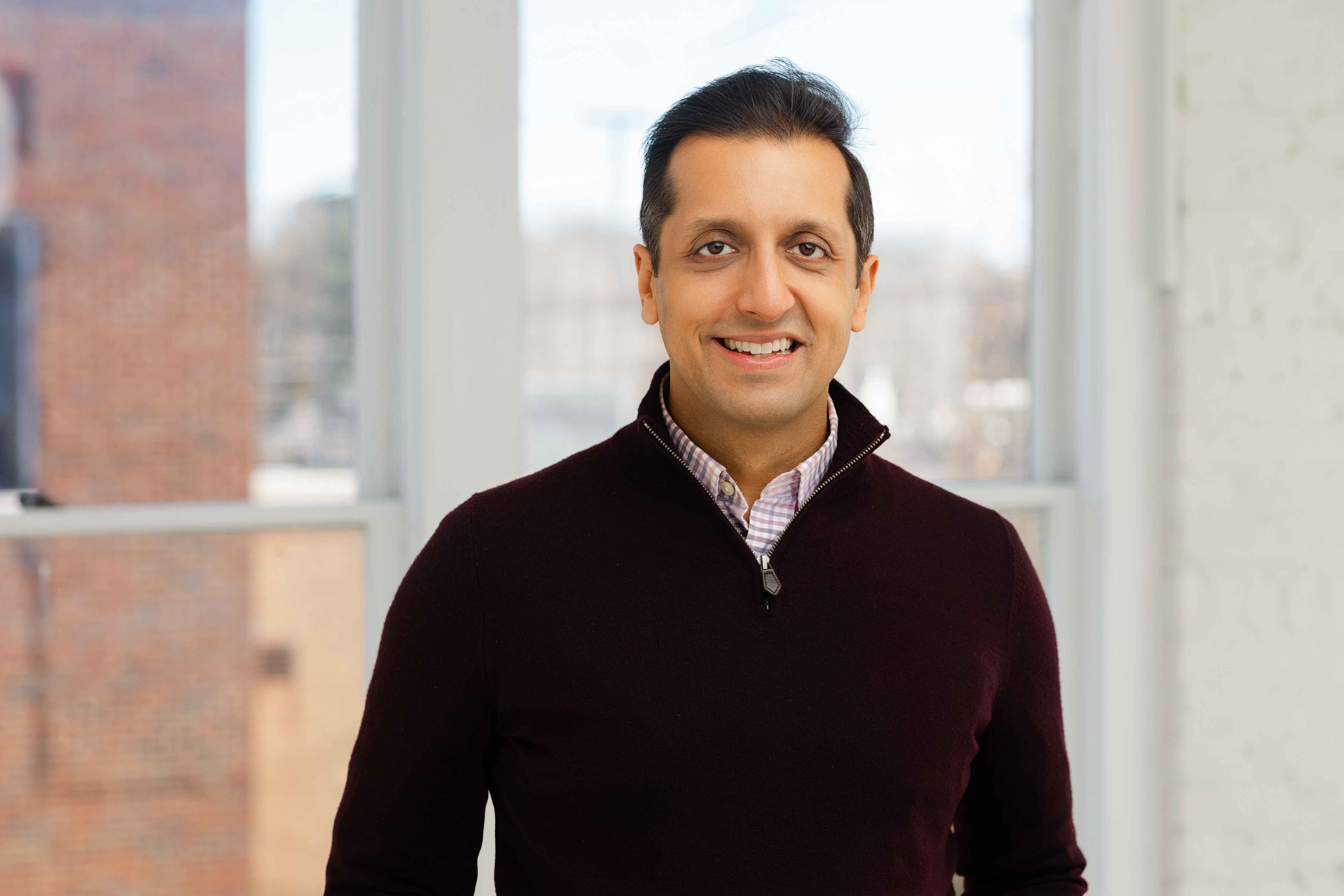
Rishi Jaitly is a distinguished entrepreneur, executive and educator with extensive global experience in technology, media, and civics.
As Professor of Practice and Distinguished Humanities Fellow at Virginia Tech, he founded the Institute for Leadership in Technology, which offers the world's first Executive Leadership Credential in the Humanities to rising leaders in the world's technology landscape. Additionally, Jaitly serves as Chairman of the National Humanities Center and, until recently, was a Senior Advisor at OpenAI.
Previously, Jaitly served as Founding CEO of Times Bridge, a leading venture capital firm facilitating international expansion for world-leading companies, including Airbnb, Coursera and Uber. Before Times Bridge, he was Twitter’s Vice President for Asia Pacific, Middle East, and North Africa. Prior to that, Jaitly held leadership roles at Google & YouTube in South Asia and in Washington, D.C., and served as a speechwriter for Google CEO Eric Schmidt.
Jaitly has also devoted a range of his career to social entrepreneurship, co-founding initiatives such as Michigan Corps, Kiva Detroit and the BMe Community, and having served as a Director at both College Summit and Knight Foundation. In addition to his Chairmanship of the National Humanities Center, he serves as a Board Director of Virginia Humanities. Jaitly, who is a former Trustee of Princeton University, was in 2022 recognized as one of Rest of World Magazine’s “Top 100 Global Tech Changemakers.”
A public speaker who has been featured in The New York Times, Wall Street Journal and Forbes Magazine, and on CNN, MSNBC and the BBC, Jaitly earned his A.B. in History and Certificate in American Studies from Princeton University.
Valuing the Diversity of Languages in a Multicultural World: Lessons from Ireland
Date: April 30, 2025 | 1:30-2:30 p.m.
Location: Harvey Hall Theatre
Speaker: Réamonn Ó Ciaráin
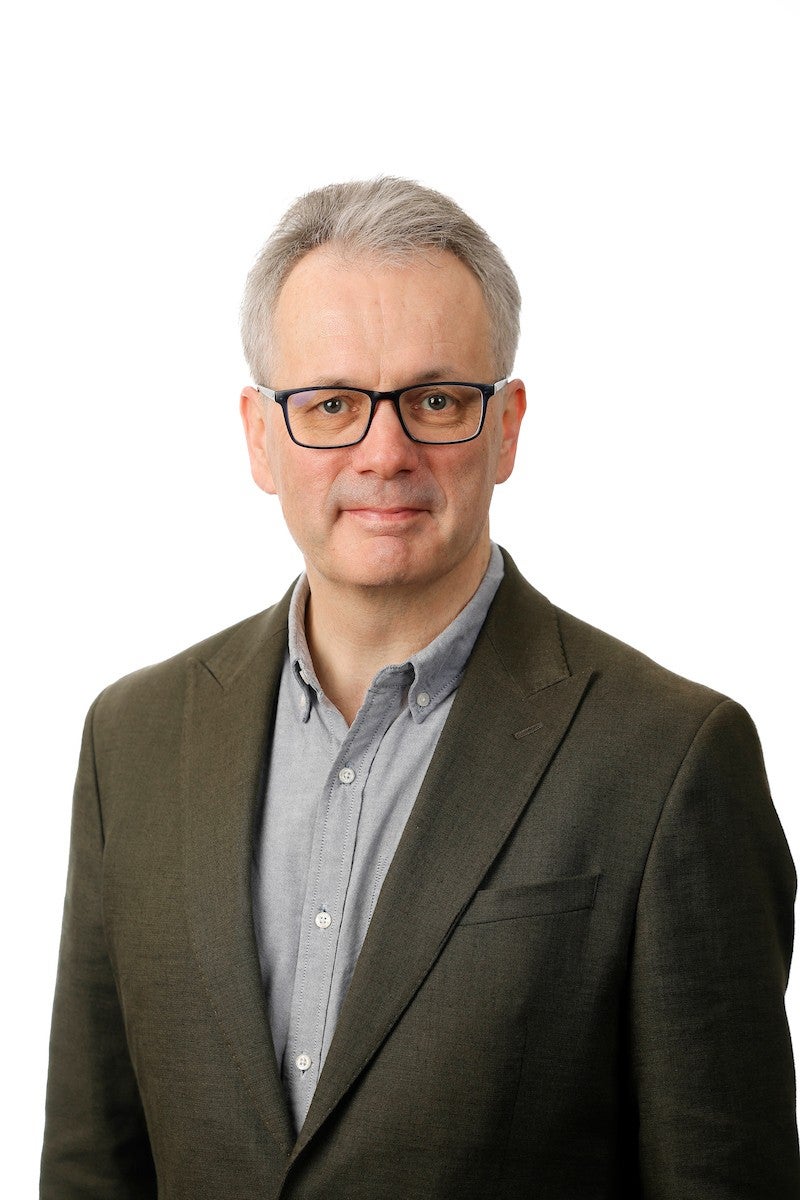
Réamonn Ó Ciaráin draws on personal experience as well as professional insights in regard to the revitalization of the Irish language since the early 1990s for this presentation. Thirty years of conflict in the Northern part of Ireland have led to aspects of culture such, as language, becoming contested to a heightened degree. While peace has brought a new dispensation some mindsets have proven to be more cautious in regards to recognizing and supporting cultural diversity. Ó Ciaráin outlines the huge advances gained in the promotion of the Irish language but does not ignore the areas where Ireland lags behind other jurisdictions in regenerating language and its heritage. The decline of Irish language usage as a community language in Gaeltacht areas, Irish-peaking regions, is an example of this. The socio-linguistic landscape has changed radically in Ireland as the country becomes increasingly ethnically diverse and multi-lingual. 12% of the population in the Republic of Ireland is made up of non-Irish citizens and 20% of the population was born outside Ireland. We find a similar demographic picture in the North of Ireland. It is no longer a question of Irish or English but Irish as the indigenous language in a linguistically rich and multi-ethnic society.
The talk outlines how language regeneration in Ireland can offer grounds for optimism for other countries across the globe where indigenous languages are in imminent danger. As with the growing need for climate justice, Ó Ciaráin will position the work to revitalise the Irish language and other endangered languages as one of the most pressing global issues. The world needs a change of consciousness with regard to language extinction which is as devastating as environmental destruction and the tragic reduction of bio-diversity. The talk demonstrates that the regeneration of the Irish language has led to impressive economic, social, and cultural growth. Significantly, support for the Irish language and its rich heritage is not confined to Ireland but is global and on the increase. Technology is assisting with this part of the story of this language which was once at an extremely low ebb.
Gael Linn for whom Ó Ciaráin has worked for over three decades have consistently demonstrated that embracing multi-lingualism enriches cognitive development, fosters cultural appreciation, and enhances social cohesion as well as generating and sustaining economic activity. In Ireland, we can and need to ensure that the constitutional protection of Irish is more than an aspiration while at the same time recognising the language rights of others in a more culturally diverse society in the 21st C. Language rights are human rights.
Réamonn Ó Ciaráin is CEO of Gael Linn. He is author of three books on Cúchulainn; Laoch na Laochra: Scéal Chúchulainn (2015), Cúchulainn, Ulster's Greatest Hero (2017) and Cú Uladh, Scéal Chúchulainn (2018). He is co-founder of Flash Fiction Armagh and co-editor of The Bramley, an anthology of Flash-Fiction. Réamonn is chairperson of Aonach Mhacha, the Irish language social enterprise behind the Irish language Cultural Centre in Armagh City which opened in March 2020 after a ten year Odyssey.
Physician-Assisted Dying: A Slippery Slope?
Date: Thursday, April 3, 2025 | 3:30-5:00 p.m.
Location: Virtual
Speaker: Dr. Bonnie Steinbock
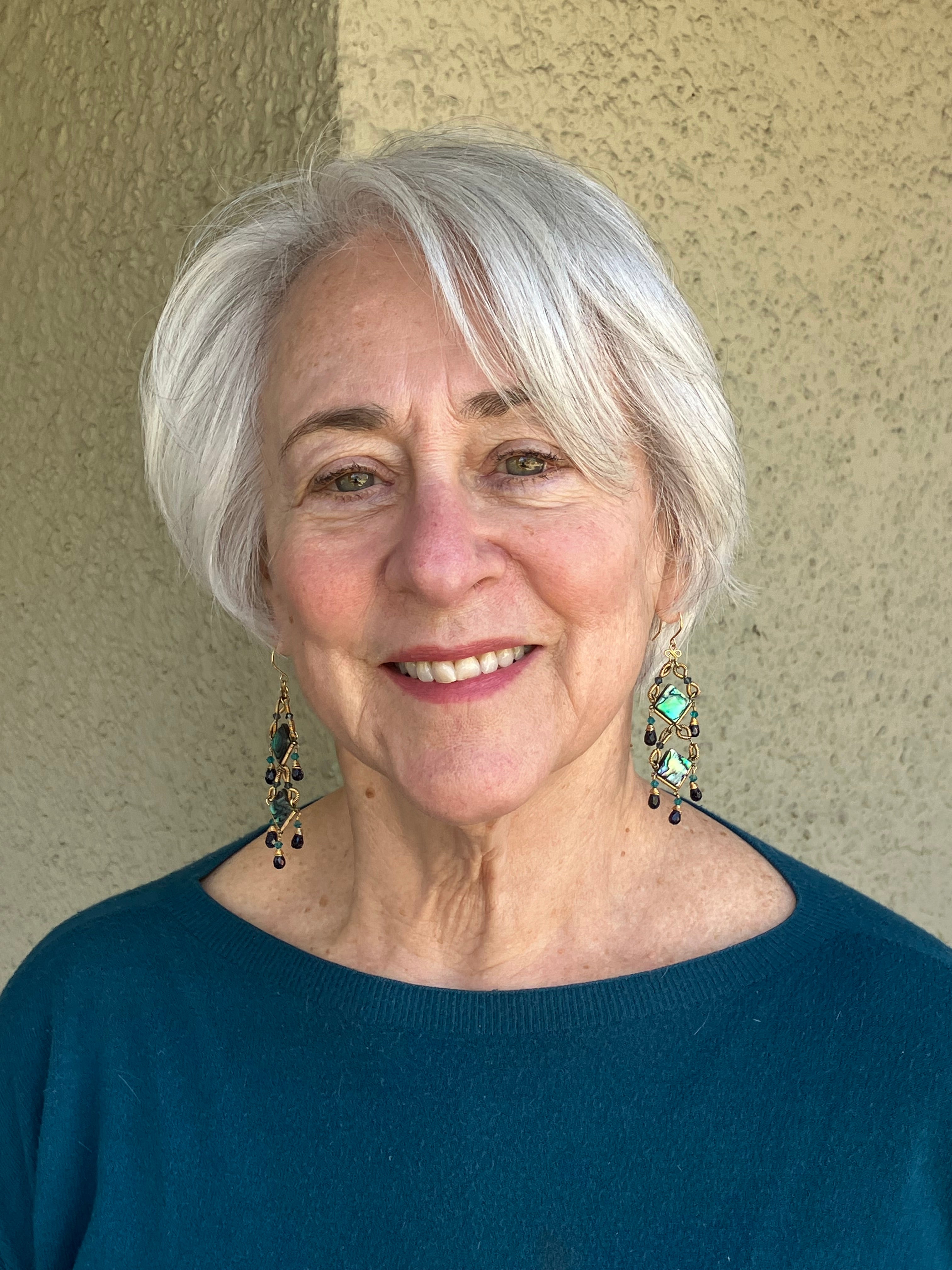
Some opponents of physician-assisted dying (PAD) argue legalizing PAD inevitably creates a slippery slope to unacceptable uses, and therefore should be rejected. Others regard PAD as acceptable, but only if the eligibility conditions are quite restrictive, including terminal illness and physical disease, and the rejection of euthanasia. Canada has expanded its eligibility conditions, including (in the future) PAD where the sole condition is psychiatric illness. I argue that the problems with psychiatric PAD are greater when combined with the rights-based approach, taken by Canada.
Bonnie Steinbock, PhD, is professor emerita of the Department of Philosophy at the University at Albany/State University of New York. A Fellow of the Hastings Center since 1986, she was a resident scholar at the Bellagio Center on Lake Como, Italy (2008), and has been a visiting professor at Santa Clara University (2012), the Chinese University of Hong Kong (2015) and Monash University in Melbourne, Australia (2017). In addition to 70 articles and 30 opinion pieces, she is the author of Life Before Birth: The Moral and Legal Status of Embryos (Oxford University Press, 1992, 2011) and the editor or co-editor of ten collections, including Killing and Letting Die (1980, 1994), Public Health Ethics: Theory, Policy, and Practice (2006), the Oxford Handbook of Bioethics (2008), and Ethical Issues in Modern Medicine, 4th - 8th editions. With Paul Menzel, she is the co-author of Bioethics: What Everyone Needs to Know (Oxford University Press, 2023).
Fetal Anomaly Abortions and the Duties of Parenthood
Date: Wednesday, March 26, 2025 | 10:30-11:45 a.m.
Location: Virtual
Speaker: Dr. Kate Greasley
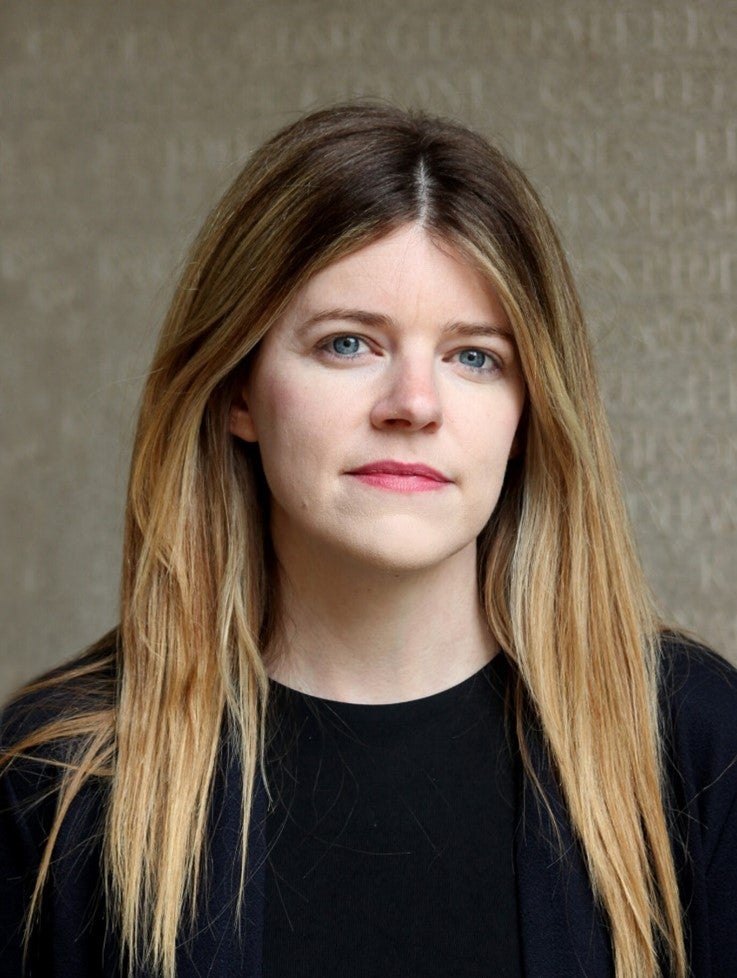
Abortion for reasons of foetal abnormality raise interesting problems for defenders of abortion rights. Seeking to avoid the special burdens of caring for a disabled child is, seemingly, among the more compelling of reasons to abort. At the same time, abortions that select against disease and disability are problematic in a way that non-selective abortions are not. This paper seeks to explain one dimension of moral ambivalence about foetal abnormality abortions, in terms of the duties of parenthood. It argues that parental obligations to affirm the life of one’s own, individual, child echo and exert force throughout gestation in wanted pregnancies in a way that they do not in pregnancies that are altogether unwanted (meaning: pregnancies that are unwanted regardless of any known foetal characteristics). To contemplate rejecting a possible child on the basis of some essential, distinguishing characteristic is at odds with expectant parents’ emotional and psychological preparations to be good parents. I argue that this feature of gestation can demystify moral ambivalence around foetal abnormality abortions against the backdrop of a liberal and permissive abortion framework that ascribes a fairly low moral status to the embryo or foetus.
Dr. Greasley is Associate Professor and Tutorial Fellow in Law at Oxford University. She has published on the abortion debate, the ethics of organ transplantation, feminist legal theory, and the morality of lying. Her books include Arguments about Abortion: Personhood, Morality, and Law (Oxford University Press, 2017), and Abortion: For and Against, with Christopher Kaczor (Cambridge University Press, 2017).
From AI to Human Engineering: Governing the Ethical Future of Technology and Humanity
Date: Wednesday, January 22, 2025 | 1:00-2:30 p.m.
Location: Memorial Student Union (Ballrooms ABC)
Speaker: Dr. Sylvester Johnson
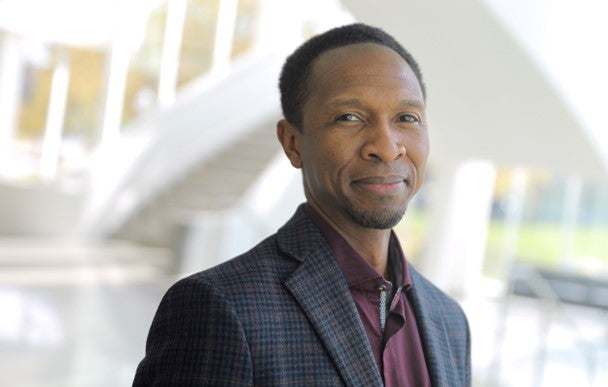
The rise of Artificial Intelligence in the form of generative AI is demonstrating the ability of machine intelligence to transform virtually every aspect of our global society. Intelligent machines can now assist in diagnosing disease, tutoring students in advanced subjects, and even discovering new research insights across multiple fields of study. At the same time, advances in genomic research and genetic engineering are yielding extraordinary possibilities in health care and biotech. There is every indication that these areas of technology innovation will not only continue their advance but also intersect to create unprecedented opportunities and challenges.
What is the future of humanity in a world shaped machine intelligence and genetically engineered humans? How is innovation blurring the boundary between the natural and the artificial? What will become of the massive wealth that technology might create? As our global society evolves beneath the weight of god-like technology and fragile social institutions, how will we govern the ethical future of technology?
In this talk, Sylvester Johnson will examine the global dimensions of technology innovation to explain the future intersection of AI and human engineering. From eradicating genetic diseases to augmenting human cognition and creativity, the fusion of AI and genetic engineering holds the promise to elevate humanity to new heights. These changes also threaten to upturn fundamental assumptions about humanity and the environment. Drawing on his experience as a human-centered technologist and founding CEO of a public benefit company, Johnson will suggest a possible way forward for governing the uncertain future of a technological society.
Sylvester A. Johnson is the 2024 Kluge Chair in Technology and Society at the Kluge Center in the Library of Congress and is the founding CEO of the Corporation for Public Interest Technology, a public benefit company whose mission centers on making technology accountable to public interest and social justice. He is also Professor of Black Studies at Northwestern University. Johnson formerly served as Associate Vice Provost for Public Interest Technology and Executive Director of the “Tech for Humanity” at Virginia Tech, where he was the founding director of the Center for Humanities. His research has examined religion, race, and empire in the Atlantic world; religion and sexuality; national security practices; and the impact of intelligent machines and human enhancement on human identity and race.
Banned Books: A Panel Discussion
Date: Tuesday, September 24, 2024 | 4:15-5:30 p.m.
Location: Swanson Library (2nd floor)
Panelists: Dr. Lopa Basu, Dr. Rickie-Ann Legleitner, and Dr. Xan Bozzo
Join us for a panel discussion on censorship and the banning of books.
This event is co-sponsored with the Menard Center for the Study of Institutions and Innovations, the University Library, the Office of Equity, Diversity, and Inclusion, the Women, Gender, and Sexuality Studies Program, the Honors College, and the Literature Committee.
The Ethics of Personalized Digital Duplicates: A Principled Framework
Date: Thursday, April 11, 2024 | 3:00-4:15 p.m.
Location: (Recording)
Speaker: Dr. John Danaher
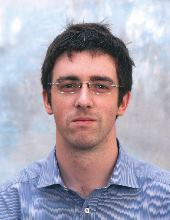
With new developments in generative AI, people are now creating digital duplicates of themselves and others to engage in a variety of tasks. In this paper, I develop a general framework for thinking about the ethics of digital duplicates. I start by clarifying the object of inquiry – digital duplicates themselves – defining them, giving examples, and justifying the focus on them rather than other kinds of artificial being. I then identify a set of generic harms and benefits associated with digital duplicates and use this as the basis for formulating a principle that stipulates the conditions that should be met in order for the creation and use of digital duplicates to be ethically permissible.
Dr. Danaher is Lecturer in Law at the University of Galway. His research focuses on the ethical, legal and social implications of new technologies. He maintains a blog called Philosophical Disquisitions, and produces a podcast with the same title. He also writes for the Institute for Ethics and Emerging Technologies.
This event is co-sponsored with the Menard Center for the Study of Institutions and Innovations.
Social Media & the News: Is Traditional Journalism Dead?
Date: Wednesday, April 3, 2024 | 7:00-8:30 p.m.
Location: Brewery Nønic
Moderators: Dr. Kate Edenborg and Eli Darnell
As older print media is being replaced with news on the internet and social media, journalists have been forced to change alongside new innovations in communication technology. As the internet becomes more inseparable from everyday life, we become accustomed to living with it. The internet helps us save time and expand our reach, but it has also led to increased isolation, divisiveness, and the spread of misinformation. Have these changes been more helpful or harmful? Are Americans becoming more divided? What role has social media play in this? Are personalized news feeds spurring more radicalization and echo chambers? We have access to more information than ever before, why then doesn't this create a more informed citizenry? Is social media making it harder to avoid misinformation? What role should regulators play in regulating social media companies? These are some of the questions we will consider in this discussion.
Privacy in a Public Ledger: Technology and Ethics
Date: Thursday, March 21, 2024 | 8:00-9:30 a.m.
Location: Virtual (Recording)
Speaker: Dr. Andrew Bailey
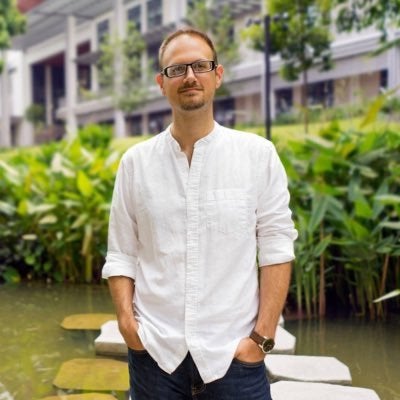 Cryptocurrencies raise vexing normative questions across a number of topics including money creation, censorship, financial inclusion, governance, and privacy. These topics are not purely technical, and require an integrated approach that draws on computer science, philosophy, economics, and more. This talk is an extended examination of the last of these topics — privacy — through a case study of bitcoin, the oldest and most important cryptocurrency. Financial privacy is under threat from a range of private and public actors. Popular digital payment networks exacerbate the problem. This talk will show how bitcoin can be used to enhance privacy along four dimensions, despite its transparent and publicly accessible ledger. These results raise questions about the value of privacy and how to best pursue it. A novel taxonomy of "cypherpunk" theories will illuminate these questions and show how bitcoin's curious approach relates to some familiar political categories. We'll conclude with an ethical framework for weighing financial privacy against other values – especially the public’s interest in curbing criminal activity. Bitcoin’s similarities with physical cash guide the way forward and suggest this irenic parity thesis: if cash makes the world better off, then so does bitcoin.
Cryptocurrencies raise vexing normative questions across a number of topics including money creation, censorship, financial inclusion, governance, and privacy. These topics are not purely technical, and require an integrated approach that draws on computer science, philosophy, economics, and more. This talk is an extended examination of the last of these topics — privacy — through a case study of bitcoin, the oldest and most important cryptocurrency. Financial privacy is under threat from a range of private and public actors. Popular digital payment networks exacerbate the problem. This talk will show how bitcoin can be used to enhance privacy along four dimensions, despite its transparent and publicly accessible ledger. These results raise questions about the value of privacy and how to best pursue it. A novel taxonomy of "cypherpunk" theories will illuminate these questions and show how bitcoin's curious approach relates to some familiar political categories. We'll conclude with an ethical framework for weighing financial privacy against other values – especially the public’s interest in curbing criminal activity. Bitcoin’s similarities with physical cash guide the way forward and suggest this irenic parity thesis: if cash makes the world better off, then so does bitcoin.
Dr. Bailey is Associate Professor of Humanities (Philosophy) at Yale-NUS College. He has a new book (w/ Bradley Rettler and Craig Warmke), Resistance Money: A Philosophical Case for Bitcoin, recently published by Routledge.
This event is co-sponsored with the Menard Center for the Study of Institutions and Innovations.
Ethics and Perspectives of Scientists Involved in World War II
Date: Thursday, March 7, 2024 | 5:00-6:00 p.m.
Location: Jarvis Science Wing (Room 114)
Speaker: Dr. Alan Scott
World War II was fought on sea, land, and air but also in laboratories. This presentation will highlight the circumstances, ethics, and motivations of those involved in this war effort; with a focus on physicists other than the iconic J. Robert Oppenheimer. It includes both Allied and Axis scientists. The dramatic and landmark movie Oppenheimer is predicted to garner awards at the 2024 Oscars on March 10, 2024. This presentation is coupled to many of the themes in the movie. Dr. Scott is Professor of Physics at the University of Wisconsin, Stout. He received his Ph.D. from Kent State University in Experimental Nuclear Physics.
Should We Remove Racist Monuments?
Date: Thursday, November 30, 2023 | 4:00-5:30 p.m.
Location: Virtual (Recording)
Debaters: Dr. Travis Timmerman & Dr. Daniel Demetriou
There have been increasing calls in recent years to remove monuments. Is this something we should be doing as a society? Join us for a civil and informative philosophical debate on this important and timely question. Dr. Travis Timmerman (Seton Hall University) will defend the view that we should remove monuments, whereas Dr. Daniel Demetriou (University of Minnesota, Morris) will defend the view that we shouldn't. The debate will be held virtually.
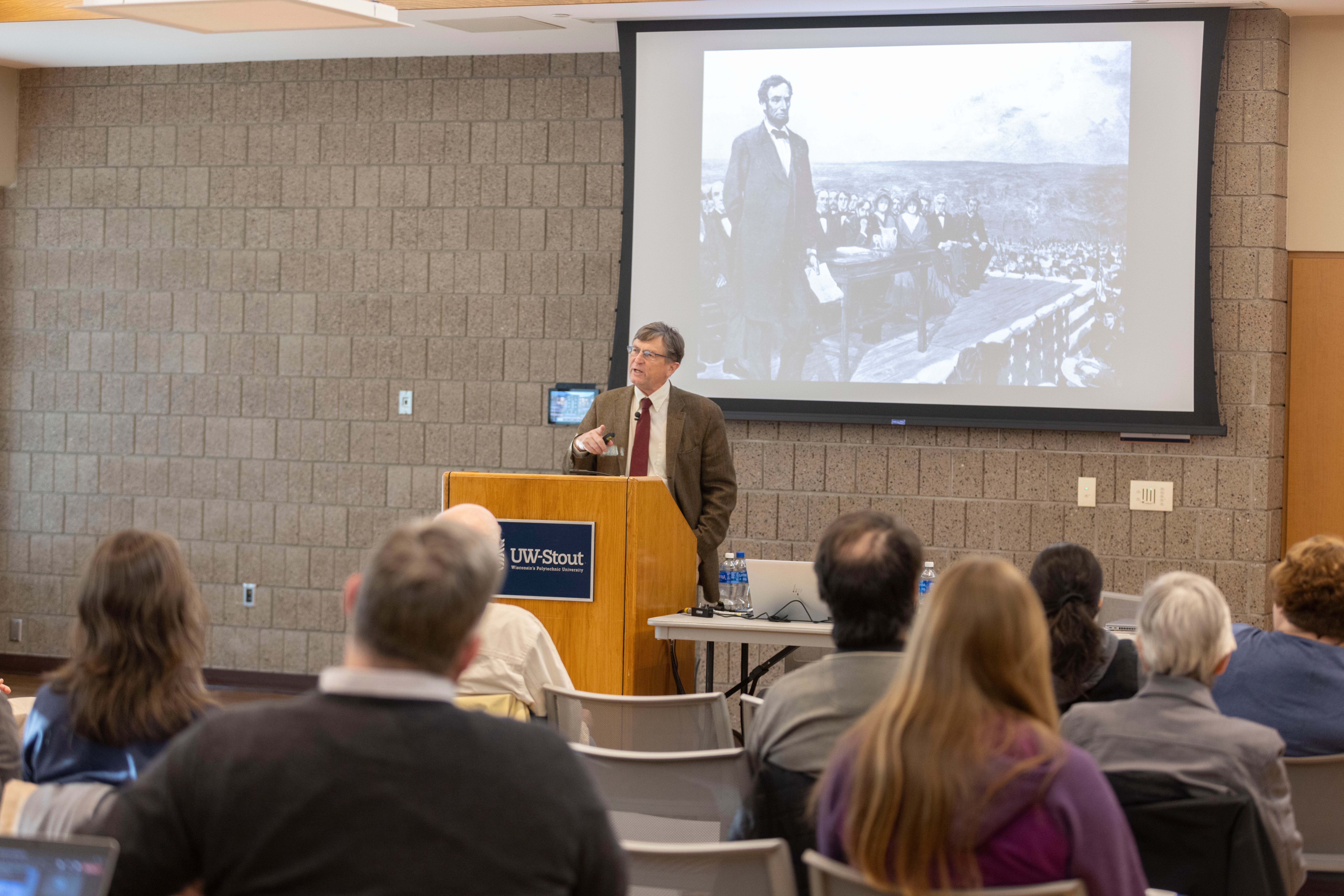
American Inheritance: Liberty and Slavery in the Birth of a Nation
Date: Wednesday, November 15, 2023 | 3:00-4:30 p.m. (Recording)
Location: Memorial Student Center (Ballroom A)
Speaker: Dr. Edward J. Larson
What is the relationship between liberty and slavery in the birth of the nation? Leaders of the founding have come under intense scrutiny for their simultaneously championing liberty while also enslaving Black people. What did the leaders of this new nation think about slavery? How did they reconcile this with their convictions in American liberty?
Join us for a discussion with Dr. Edward J. Larson, Hugh and Hazel Darling Chair in Law and University Professor at Pepperdine University. Larson is the author of seven books and is the recipient of the 1998 Pulitzer Prize in History.
Philosophers' Café
What are Philosophers’ Cafés?
Philosophers’ Cafés are public forums held at local pubs and coffee shops in which community members engage in open, friendly, and respectful dialogue in a relaxed and informal setting. Meetings are led by faculty from UW-Stout and UW-Eau Claire, with topics ranging from traditional philosophical problems to pressing contemporary ethical issues.
Who should attend?
Everyone is welcome to attend. A diversity of views and approaches is encouraged, and no formal training in philosophy (or anything else) is required – just an interest in good questions and good conversation.
Current Schedule
How Should We Regard Refugees?
Date: Wednesday, September 10, 2025 | 7:00 p.m.
Location: Brewery Nønic
Moderator: Dr. Mitch Ogden (English, UW-Stout)
Refugees are often portrayed as passive victims or dangerous outsiders—figures defined by crisis, displacement, and dependency. But what if we regarded refugees not only as survivors of calamity, but also as creators and cultural producers? This conversation invites us to reconsider the refugee not as a perpetual victim, but as a creative agent of modernity: someone who navigates ambiguous spaces and generates meaning within them through art and storytelling. How might a reconsideration of refugees open up new ways of thinking about identity, agency, and belonging?
AI and Our Humanity
Date: Wednesday, October 8, 2025 | 7:00 p.m.
Location: Brewery Nønic
Moderator: Dr. Matthew Meyer (Philosophy, UW-Eau Claire)
We are told that AI is either going to bring an era of extreme abundance (and hopefully peace), or it will bring about the extinction of humanity. These are extreme predictions. But even if we accept the rosy prediction, what will be lost? As one philosopher puts it: how will we find meaning in a "solved" world? What if the same technology that brings us more leisure and freedom than ever before also destroys our sense of purpose?
The Wisconsin Idea: What Does It Mean to You?
Date: Wednesday, November 12, 2025 | 7:00 p.m.
Location: Brewery Nønic
Moderator: Dr. Joan Navarre (English, UW-Stout)
The Wisconsin Idea emerged in the early 1900s and helped put the University of Wisconsin system on the map. What is the Wisconsin Idea? What does it mean to you?
Are Gender Disparities in the Workplace a Problem?
Date: Wednesday, December 10, 2025 | 7:00 p.m.
Location: Brewery Nønic
Moderator: Dr. April Bleske-Rechek (Psychology, UW-Eau Claire)
Beginning with some data on persistent gender disparities in the workplace and data from my lab on people’s reactions to various gender disparities, we can discuss a variety of questions: which gender disparities do we as a society tend to worry about, and which disparities tend to go unnoticed? What are the possible causes of gender disparities in job representation, and which of those are presumed to be the primary causes of different types of disparities (e.g., male-dominated vs female-dominated jobs)? Should our final goal be gender parity in representation for all jobs? If only some jobs, which ones? When in tension, how do we reconcile societal concern for group parity with concern for individual choice?
What Responsibility Does Society Have Toward Children?
Date: Wednesday, February 11, 2026 | 7:00 p.m.
Location: Brewery Nønic
Moderator: Dr. Tina Lee (Anthropology, UW-Stout)
Since the 1960’s, all U.S. states have passed laws that require a large range of professionals to report abuse and neglect of children and created bureaucracies to field reports and investigate them. These child protective services (CPS) systems have the power to remove children from their parents and place them in foster care, with the stated aim of ensuring that vulnerable children are safe. We know, however, that Black and Indigenous children are disproportionately represented in CPS caseloads and that most reports are of neglect, which is closely tied to poverty. We also know that the United States has abysmal rates of childhood poverty and does little to support families as compared to many other high-income countries. There is also evidence that children involved with CPS face many negative outcomes. Some scholars have thus begun to refer to CPS as “family policing” and call for its abolition. What responsibility does a society have to children? What is the best way to keep children safe in the context of rising inequality? What is the balance between safety and support for parents?
Perceptions of Law and Its Discontents
Date: Wednesday, March 11, 2026 | 7:00 p.m.
Location: Brewery Nønic
Moderator: Dr. Richard Gee (Sociology, UW-Stout)
Law is an arena of debate and tension. That being said, there are several different ways in which law can be viewed. Is the law an arena for conflict? Is it an arena for consensus? Is it rhetorical? Is its function to protect? We will discuss law as viewed through different avenues to illuminate the conversation around societal responses to legal decisions.
Can Wartime Dehumanization Be Avoided?
Date: Wednesday, April 8, 2026 | 7:00 p.m.
Location: Brewery Nønic
Moderator: Dr. David Seim (History, UW-Stout)
Beginning with brief consideration of one case of wartime dehumanization (namely, candid admissions by Vietnam War veterans), our conversation might consider a few questions: How does a military organization mentally prepare life-valuing human beings to kill other human beings because they are the enemy? How do wartime events unfold such that combatants cease to perceive enemy combatants as fully human? Are there potential factors prior to military events that can worsen the extent of dehumanization?
Abortion and Human Equality
Date: Tuesday, September 17, 2024 | 7:00 p.m.
Location: Brewery Nonic
Moderator: Dr. Alexander Bozzo (Philosophy, UW-Stout)
Few moral issues are as hotly contested as abortion. But what are the main arguments for and against it? In this Café we will discuss some of the these arguments (and the fanciful thought experiments associated with them!). In particular, we will discuss a recent argument put forward by opponents of abortion: "the moral equality argument." According to this argument, differences in intellectual ability, mental capacity, physical strength, race, sex, and so on, are irrelevant to whether human beings have equal moral rights. But what then grounds this equality? According to this line of argument, the only plausible ground is our common humanity. But, since fetuses are humans, doesn't this imply that fetuses too are moral equals, and thus have a right to life?
The Nature and Limits of Forgiveness
Date: Wednesday, October 9, 2024 | 7:00 p.m.
Location: Brewery Nonic
Moderator: Dr. Sean McAleer (Philosophy, UW-Eau Claire)
Forgiveness is the stuff of everyday life, but most of us don’t think about it very much. Tonight we’ll try to remedy that by asking questions like What exactly are we doing when we forgive someone? Is forgiveness always good? Does self-respect imply that we shouldn’t forgive an unapologetic wrongdoer? Are some things unforgiveable? Can I forgive you for wronging you did to somebody else? Is self-forgiveness conceptually coherent?
Diversity, Equity, and Inclusivity: Why the Controversy?
Date: Wednesday, November 13, 2024 | 7:00 p.m.
Location: Brewery Nonic
Moderator: Dr. Rickie-Ann Legleitner (Interim Executive Director of Inclusive Excellence, UW-Stout)
In recent years, DEI initiatives across the country have faced heavy scrutiny from politicians and their constituents. These attacks include attempts to ban books, cuts to funding for DEI positions and programming, bans on teaching or using certain language in K-12 and college classrooms, overturning Affirmative Action in higher education admissions, and questioning the qualifications of “DEI hires” to effectively perform their jobs. Our discussion will explore where the scrutiny of DEI comes from, who is impacted by these attacks, and who benefits and who loses when this criticism gains traction.
Classical Ethics for the (Post)Modern World
Date: Wednesday, December 11, 2024 | 7:00 p.m.
Location: Brewery Nonic
Moderator: Dr. Chris Freeman (History, UW-Stout)
Socrates, the Buddha, and Marcus Aurelius have much in common and provide thoughtful approaches for developing a so-called “Technology of Self.” In the classical view, developing a technology of self is essential for realizing the good life. It just so happens that the classical technology of self, made up of equal parts of mindfulness and letting go, has much to tell us about living the good life in today’s topsy turvy post-modern world.
Where the Wild Things Are
Date: Monday, February 10, 2025 | 7:00 p.m.
Location: Brewery Nonic
Moderator: Dr. Julie Beston (Biology, UW-Stout)
As human civilization has expanded, the wild places of the world have shrunk, and the diversity and abundance of wild animals have diminished. What responsibility do we have to those wild things? Humans evolved, just like every other species on the planet. So why are our modifications of the world around us viewed so differently from the activity of other ecosystem engineers, like beavers? What limits should we place on our use of wilderness and wildlife? Such limits are often controversial; just consider the relisting of wolves a year after Wisconsin’s ill-fated 2021 hunt or the implementation of reservation requirements in some national parks. When we lack the will or the resources to save all the wild things, how do we decide which ones are acceptable losses?
Is Free Speech Too Free?
Date: Monday, March 24, 2025 | 7:00 p.m.
Location: Brewery Nonic
Moderator: Dr. Tim Shiell (Philosophy, UW-Stout)
The United States is unique in the strength of its protections for expression. Other first world democracies enforce many more restrictions on expression. Have we gone too far in protecting, for example, hateful messages at the funerals of soldiers and students, falsely claiming a military honor, racist and other biased expression, violent expression, and burning the US flag in protest? What, if anything, justifies legal protections for these?
Free: Priceless vs. Worthless
Date: Monday, April 7, 2025 | 7:00 p.m.
Location: Brewery Nonic
Moderator: Dr. Chris Ferguson (Economics, UW-Stout)
Economists don’t spend as much time thinking about when the price of something is $0 as we probably should. The philosophical implications of our conceptions and measurement of value in these cases can profoundly impact health, sustainability, policy making, war and peace, personal decision making, relationships, happiness and other key local, national, and global areas of life. In this Café, will discuss these issues!
Should We Still Listen to Thriller?
Date: Wednesday, September 20, 2023 | 7:00 p.m.
Location: Brewery Nonic
Moderator: Dr. Alexander Bozzo (Philosophy, UW-Stout)
What is the relationship between an artwork’s ethical value and its artistic value? Can works of art be worse because of their ethical flaws, or better because of their ethical merits? Can artworks even be the object of ethical evaluation in the first place—aren’t such judgments reserved for persons, actions, intentions? Such questions in the philosophy of art have reemerged in recent years: What are we to do with the comedy of Bill Cosby or Louis C.K.? Should we still listen to Michael Jackson? I don’t have the answers, but I’m hoping you might.
Dungeons & Dragons & Discourse
Date: Wednesday, October 11, 2023 | 7:30 p.m.
Location: Brewery Nonic
Moderator: Dr. Cody Reimer (English, UW-Stout)
The resurgence of D&D, thanks in part to popular media like Stranger Things and the rise of actual plays like Critical Role, means that more people than ever are participating in the hobby, and that new generational and cultural sensibilities are being brought to bear on the writing, design, and community of “The World’s Greatest Roleplaying Game.” We’ll talk about the discourses that shape and move how people think about, write through, design for, and play in Dungeons & Dragons.
Drawing the Line: Does Tolerance Have Limits?
Date: Wednesday, November 8, 2023 | 7:00 p.m.
Location: Brewery Nonic
Moderator: Dr. Adam Kunz (Political Science, UW-Eau Claire)
A core liberal value of a just society is the notion that it should be tolerant of a multitude of lifestyles, beliefs, and cultures. At the same time, justice is generally believed to demand adherence to mutually agreed upon rules that all must obey, e.g., laws and societal norms. To what extent are the concepts of tolerance and universal justice consistent with one another? How should a just society define tolerance? How far does it extend and does it have limits? To root the discussion, consider the case of Employment Division v. Smith, in which an insular minority religion ran afoul of generally applicable criminal laws. How should such cases be resolved?
Back from the Dustbin? The Marxist Critique in the Twenty-First Century
Date: Wednesday, December 13, 2023 | 7:00 p.m.
Location: Brewery Nonic
Moderator: Dr. Christopher Marshall (History, UW-Stout)
With the demise of the Soviet Union in 1991, the Marxist critique seemed consigned to history’s dustbin. Indeed, in 1992 Francis Fukuyama famously proclaimed liberal capitalism’s apparent victory as signifying “the end of history,” with humankind’s political and economic evolution reaching its zenith. The 1990s saw “Third Way” ideology, embodied in leaders like Bill Clinton and Tony Blair, attempt to address inequality via mechanisms of the market. However, despite these bold claims, the last thirty years have witnessed deepening inequality, expanded corporate power, economic crises (particularly in 2008), and democratic retreat. Given these realities, is it time to revisit the Marxist critique? Can it provide useful perspectives and strategies for dealing with the challenges of our historical moment?
What’s the Role of Fathers in Pregnancy?
Date: Wednesday, February 7, 2024 | 7:00 p.m.
Location: Brewery Nonic
Moderator: Dr. Lauren Johnsen (Communication, UW-Stout)
What is or is not appropriate for the outsider/insider within the context of maternal health? That is, what is appropriate or not for those supporting a pregnant person throughout that process? How do we know what is or is not appropriate for those involved but not pregnant, those I am calling the insider/outsider. I specifically look at fathers who are often expected to be present but silent throughout pregnancy, labor, and delivery, but this discussion could broaden to include others who are engaged in supporting a pregnant person but not actively pregnant themselves. Essentially, what is the role of this outsider/insider, someone involved and expected to be present who may not know their role or boundaries?
The Trolley Problem: Beyond the Memes to Understanding Ethical Decision Making
Date: Wednesday, March 6, 2024 | 7:00 p.m.
Location: Brewery Nonic
Moderator: Dr. Monica Berrier (Philosophy, UW-Stout)
Perhaps you’ve seen the trolley problem memes. A cartoon stick figure is standing at a railroad junction, and he has a choice: allow a trolley to continue its path where it will surely strike 5 people on the tracks or divert the trolley onto another track where only one person is in mortal peril. Trolley problem memes have been making light of the follies of human existence for about a decade, but did you know that it originated in 1967 in a philosophical paper about abortion? In this interactive discussion, we’ll learn about the origins of the trolley problem and its significance to ethical theorizing by considering our moral intuitions on several different variations of the trolley problem that have been the subject of academic philosophical inquiry for over 50 years.
Appropriation Art: The Case Against Andy Warhol
Date: Wednesday, April 10, 2024 | 7:00 p.m.
Location: Brewery Nonic
Moderator: Dr. Cynthia Bland (Art History, UW-Stout) & Hon. Paul H. Anderson (retired, Minnesota Supreme Court Justice)
In a 7-2 vote, the Supreme Court ruled in May of 2023 against the Andy Warhol Foundation and the artist’s use of Lynn Goldsmith’s photograph of Prince. The ruling delivered a blow to appropriation artists, determining that Warhol’s work was not transformative and of the same essential nature as the original. Retired Justice Paul H. Anderson of the Minnesota Supreme Court will provide context for the ruling, while art historian Dr. Cynthia Bland will focus on the dissent, written by Justice Kagan, which argues that Warhol’s work is “fair use” and not copyright infringement. Should the court determine the merit of artistic contributions, or should artists be set free to borrow, transform, and be inspired by original works?
Russia’s War in Ukraine
Date: Wednesday, April 24, 2024 | 7:00 p.m.
Location: Brewery Nonic
Moderator: Dr. Heather Fielding (English, UW-Eau Claire)
This session considers ethical questions related to Russia’s current war in Ukraine. While the fact that the war was an unprovoked gesture of imperial aggression is not in question, the broader situation poses many ethical challenges for Ukraine, for Russians, and more broadly for the international community. What is the ethical responsibility of other nations--how far should other democracies go toward defending Ukraine, which is a democracy defending itself from a strong authoritarian neighbor? Other nations could save Ukrainian lives by stepping in, at the risk of provoking a wider conflict—how are allies negotiating this situation, and are they making the right decision? Other ethical questions are posed for Russians—what is the responsibility of Russian citizens to stand up for peace when they live in an authoritarian state and risk their lives in doing so? What responsibility do international businesses bear that continue to function in Russia, or that enable the Russian state or individual wealthy Russians? Within Ukraine, what are the ethics of preventing men between the ages of 18 and 60 from leaving the country, and what rights should be afforded to conscientious objectors. Should Ukraine agree to give up territory in order to stop the war?
Discussion Dinners
The Center for Applied Ethics (in conjunction with the Menard Center and the Office of Student Opportunity and Excellence) hosted four discussion dinners during the 2025-2026 academic year.
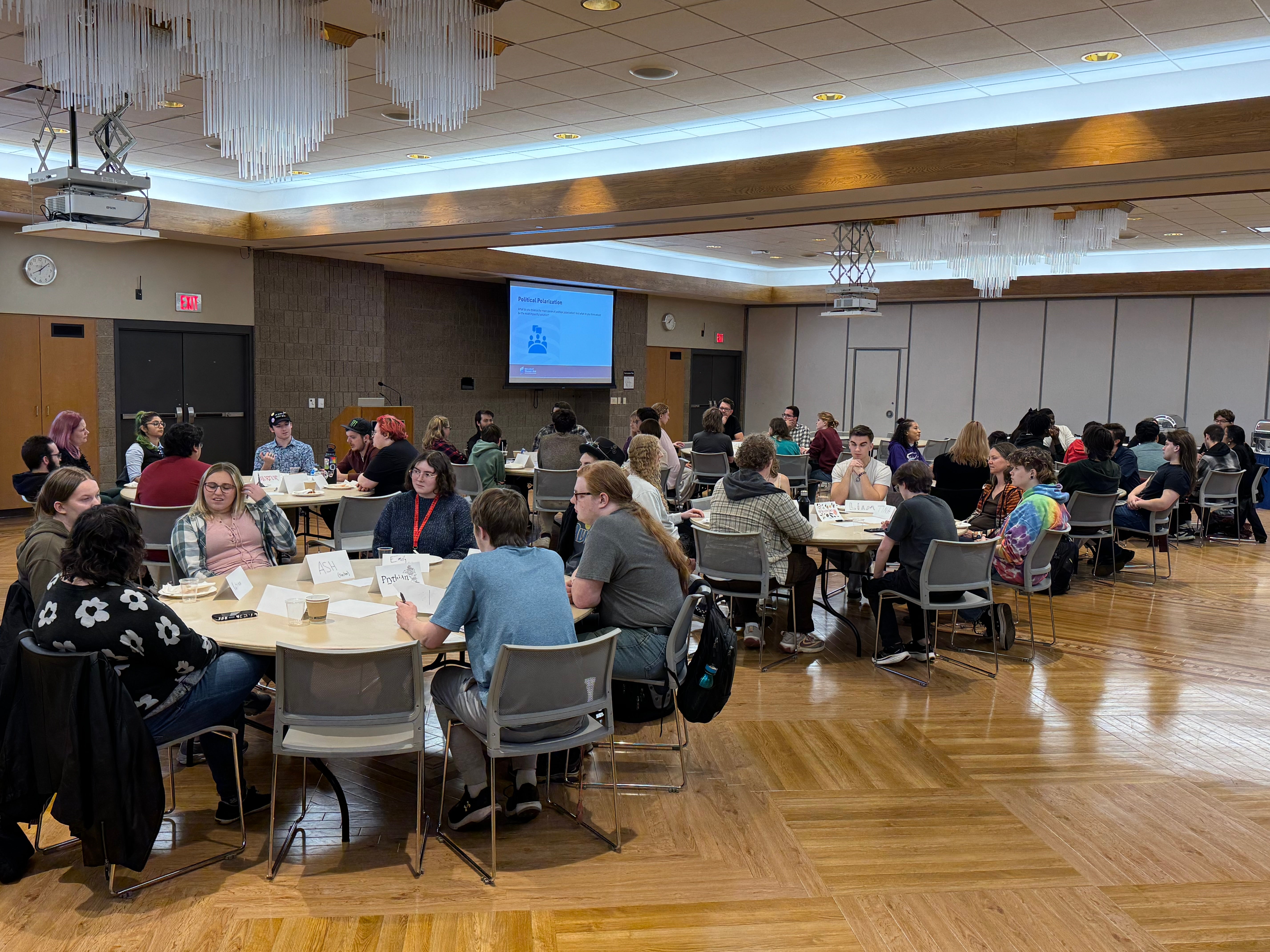
The aim of the dinners was to have students meet and discuss controversial moral and political issues over dinner together. This was made possible thanks to a grant from the Wisconsin Institute for Citizenship and Civil Dialogue. The dinner topics were: Political Polarization, Abortion, Immigration, and Democracy.
Philosophy Club
The Philosophy Club is a student-run organization which meets every other Wednesday @ 5pm. The club discusses fun and interesting topics related to philosophy and contemporary events, such as:
- Do we have free will?
- Is it wrong to eat meat?
- Does God exist?
- What is it to be racist?
- Can computers think?
Please visit their Stout Connect page for more information.






